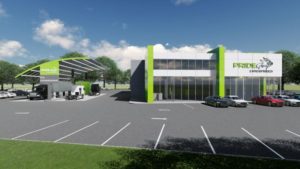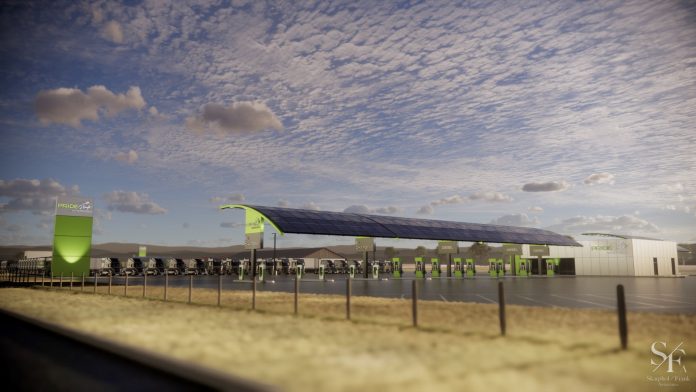Javed Nadeem, Vice President of EV Infrastructure at Pride EV, explains how the company is working to address the main challenges facing commercial fleets looking to make the transition to electric.
As the demand for electric vehicles (EV) increases in line with the global energy transition, so too does the need to ensure an efficient and capable EV charging infrastructure. One company that particularly recognises this need is Pride EV. Based in Canada, Pride EV is seeking to reduce the environmental impact of transport with its offering of electric medium-to-heavy commercial vehicles. Committed to supporting a reliable EV charging infrastructure, the company also focuses its efforts on offering a range of EV charging stations suitable for a wide variety of settings.
The Innovation Platform spoke to the Pride EV to find out how the company is working to address the challenges associated with the transition to EVs.
How would you summarise Pride EV as a company? How have you developed into the EV market?
At Pride EV International, our mission is to protect future generations by reducing the environmental impact of the transportation industry by offering world-class electric medium-to-heavy duty vehicles and EV charging stations.
Pride EV is a turnkey operation that eases the process of assembling sustainable fleets for our clients. We aim to help customers transition toward EV fleets, while also building out EV charging stations across North America to support the future needs of our communities. We analyse, design, value-engineer, build, automate, operate, and maintain a variety of models of high-power electrical charging stations for our customers’ EV fleets, as well as the general public. We are also working to develop our fleet of electric vehicles in our North America logistics subsidiaries.
What does the current EV landscape and infrastructure look like in Canada? Is it stable enough to support the rapid increase in electric vehicles expected in the coming years?
The current EV landscape is evolving very quickly in Canada. The velocity at which new programmes in the governmental policy sector are rapidly expanding, coupled with the increased investment in research and development from original equipment manufacturers (OEMs), and the initiatives being put forward by utility companies to manage grid impact for EV infrastructure, make it clear that Canadians are driving towards EV transition and adoption.
As a whole, the North American transportation industry is keen to accelerate the sustainable mobility movement, but the availability of EV charging stations and infrastructure for fleet customers remains a concern. According to NRCAN’s latest data, there are over 16,000 charging ports available coast-to-coast for Canadian drivers to access but only 3,300 chargers are level-3 DC fast chargers. The data indicates that we are far from being able to sustain commercial EVs and the evolving charging needs of the logistics industry, however positively the aforementioned programmes appear.
The good news is that the EV charging network expansion has found some momentum and is growing at pace, although a lot more is needed, especially in the Class 3 sector.
One of the most common barriers to adoption is ‘range anxiety’, although the promise of fast, reliable, safe, and most importantly, convenient charging infrastructure with simple accessibility will help ease apprehension. Range anxiety is the concern that loads will take longer to deliver for long-haul deliveries as the driver will have to stop for a few hours to recharge, rather than simply stopping for a few minutes to refuel a diesel truck. A strategic and quick expansion of the DC fast charging network will be the key factor to achieve net zero targets.
Another factor that would have a major influence on the rapid growth of the Canadian EV landscape is the policies of utility companies to neutralise the pressure on utility grids due to the surge in demand. Utilities are key stakeholders in fuelling the transition to net zero.
Today, Pride EV offers up to 350 kW DC fast chargers, and we are not far from seeing fast chargers over 1 MW. This progression will result in electrical power demand stress-inducing hikes on the existing transmission and distribution infrastructure. There is a clear need for a co-ordinated effort from both utility generation and local distribution centres to understand the future capacity constraints and upgrades needed to sustain and maintain safe, cost-effective and efficient supply to the new EV charging network. We must, however, acknowledge that utilities in Canada are leading the charge in accelerating this transition to become more environmentally friendly.

The cost of vehicles is the next big thing in the transition. EVs are initially a more significant investment; however, what clients must understand is that, with the savings they will experience from lower repair costs (average of 1-150 moving parts for commercial vehicles) coupled with the cost savings from fueling the vehicle, the unit will pay for itself in four years or less. Customers must also understand that the total cost of ownership with an EV is comparable with internal combustion engine (ICE) vehicles. Government-sanctioned incentive programmes assist in offsetting the costs, further ensuring that the investment makes economic sense. We believe that continued and consistent support from the federal and provincial governments must continue for both vehicle and electrical infrastructure until the overall cost of ownership remains at parity with the traditional combustion engine and fuel model.
Why should companies consider electrifying their fleet and what are the key challenges facing commercial fleets when it comes to electrification?
The shift toward fleet electrification is important to protect the future generation from environmental impact. While electrifying cars is undoubtedly a major step toward the zero emission target, it will be fleet electrification that will lead the way towards e-mobility insurgence. There is no short answer to why companies consider electrifying their fleet – motivation is diverse, and at the same time, it comes with a few challenges. Electrification of the fleet is not only about saving the planet, but it is also good for businesses, and there are many compelling reasons for companies to initiate the transition.
When we investigate major brands at national and global levels, sustainability commitment is part of their vision statements. However, without transitioning to a zero-emission fleet for their product deliveries, it is impossible to meet overall sustainability targets. Moreover, we hope to help companies understand that everything is connected, and investment in electrification will bring efficiency in operations and savings by reducing fuel and maintenance costs, thus reducing the total cost of ownership gradually.
The economic feasibility of electrifying a fleet is the deciding factor that drives adoption in this sector for small-to-medium-size fleet owners; hence, the ability to analyse the business model of these logistics companies is paramount to creating their adoption plan. The increased sustainability of their fleet is not enticing enough to move towards electrical vehicles if the transition is not economically viable in the short term. Most fleets at this scale will only be inclined to move to an electrical fleet based on the bottom-line earning, the total cost of ownership, and ease of operation. Environmental progress and economic feasibility go hand in hand, and they must intersect to make the Return on Investment (ROI) look good in the short term as well, so as to change fleet managers’ strategies.
Vehicle availability, comparably higher cost, range of vehicles and a lack of EV charging stations are today’s major challenges for companies to plan the electrical transition. It is the role of all stakeholders connected to the industry, including policymakers, OEMs, and the industry itself, to generate a compelling case for businesses to embrace the transition and start benefiting from the available opportunities and stipends.
How can Pride EV support commercial fleets in their transition to electric?
Our message to commercial fleets is very clear. We must all come together to begin transitioning and do so once there is an incentive. We have a complete ecosystem to facilitate a seamless and smooth fleet transition toward electrification, including EV chargers and zero-emission vehicles.
We are both the owner and operator, and our key objectives include not only achieving economical sustainability with asset optimisation but also ensuring resiliency, safety, and reliability. We strongly believe that sustainability and efficiency go hand in hand. As one of the leaders in an industry dealing with the different nature of businesses in the heavy vehicle segment, the Pride group understands the operational needs and challenges of any fleet. We also enjoy a very close working relationship with leading OEMs in the EV space, which provide us with the leverage where we can lead the alignment between the industry need and innovations.
We have the in-house expertise to develop a vertically integrated grid plug charging solution for any fleet size. Our fleet electrification approach starts by building a partnership with fleet operators to understand vehicle usage trends, future expansion needs, and operational behaviour. These data points help us formulate a roadmap for a smooth transition and optimise the total cost of ownership.
What does 2022 and the coming years look like for Pride EV?
Currently, Pride operates in over 30 locations with sales, parts, and full-service centres with the ability to do limited warranty work. We have seven new facilities coming in the next 30-90 days and will be doubling our footprint in 2022, with over 50 facilities with an end goal of planting one location every 200-500 miles on all major North American highways. Each of our future dealerships/sites will be equipped with exclusive overnight parking and fast-charging infrastructures powered by global industry leader ABB that will allow full charging access to our customers and the public with easy payment options at competitive rates. The facilities will be outfitted with chargers that will support all makes and models of electric vehicles – including other light and medium-duty EV trucks from varying OEMs, including Tesla.
Our line of chargers is powered by ABB Worldwide and currently includes 25 kW DC wallboxes to 350 kW high-power chargers. We are working closely with our partners for the next generation of fast chargers in the 600 kW and higher range to improve charging speed and get drivers back on the road sooner. Our objective is to ensure that the process of electrification is a no-brainer for our fleet customers. Federal and municipal government incentives are in effect in many states and provinces, giving clients an additional push to begin the integration of electrification.
We look forward to continued growth with our line-up of EVs and charging options so that we can be the go-to North American electrification partner for fleets, clients, and governments of all sizes.



